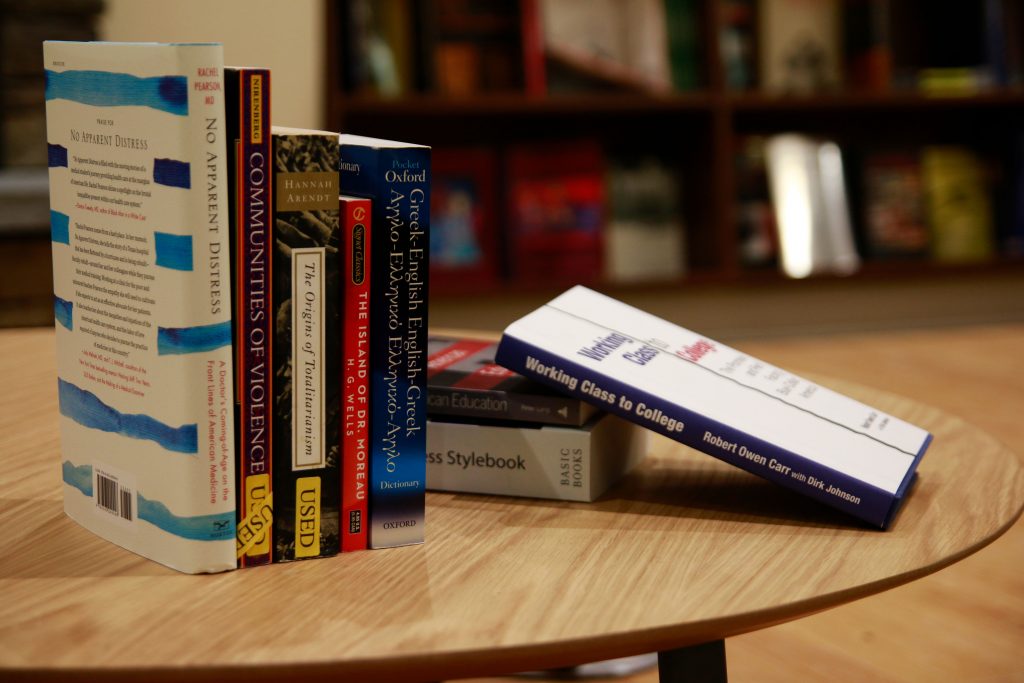
Students taking classes with Josh Reno will not need to buy books this semester. Reno, an assistant professor of anthropology, is one of several professors at Binghamton University who are doing away with books, citing high prices for students and a lack of necessity for instructors.
Nevertheless, most classes at BU still require textbooks, and for some students, affording them can be a struggle. At the start of this semester, Eleni Demas, a sophomore majoring in biomedical engineering, paid about $300 for four textbooks. To lower the price, Demas purchased one book from Amazon and four others from the University Bookstore. Compared to what others pay, her textbooks were cheap — the College Board estimates the annual cost of books and materials to be over $1,000, and according to a survey from the United States Public Interest Research Group, 65 percent of respondents said they had decided against buying a required textbook because it was too expensive.
For BU students, the main textbook vendor is the bookstore, which is owned by Barnes & Noble. Many students, however, choose to buy books online or from classmates because the competition between sellers can lower prices, especially for used books. Amazon is one popular option, along with Facebook Marketplace, Textbooks.com and Chegg. According to Heather Sheffer, manager of the bookstore, the store offers students the convenience of knowing they have the right book, and will price-match recognized online retailers, but not “online marketplaces” such as Amazon Marketplace, where Amazon acts as a third party to sell used books.
“Professors tell us exactly what they need, and if the professor changes his mind and wants something else, we’ll take it back from everybody, no questions asked,” Sheffer said. “We’ll also extend the return period so if you change your classes, you can still return books, where that’s harder with outside companies.”
Assaf Harel, an assistant professor of Israel studies, currently teaches ISRL 227: Cultures and Society in Israel, which doesn’t require the purchase of any textbooks because there are none tailored to the course. Instead, Harel posts all the necessary material online, where students can access it for free. Although Harel does not require textbooks for his class, he said many factors contribute to how effectively the system works in terms of educating students.
“From the perspective of the students themselves, it might be unfair,” Harel said. “From the perspective of the publishing press, they’re providing you this wonderful collection of ideas and knowledge that make this knowledge accessible to you. People put in money, there are jobs involved.”
According to Harel, students can avoid high costs by renting books or buying used books, but Demas said she must purchase, rather than rent, her textbooks because her classes require online access codes that are not valid if she rents or buys used books.
But professors like Reno are embracing another solution: open access, a term that refers to efforts to free restrictions on access to academic and research materials.
“The open-access movement is not anything specific — it’s not a specific ideology or organization,” Reno said. “It’s just a common concern among people trying to get around the firewalls between the work people do and the general public.”
Although many professors are sticking with textbooks, more and more are straying away from assigning required texts for their classes. Yandeli Cabrera, a junior majoring in philosophy, politics and law, said most of her professors don’t require actual textbooks, but assign other supplementary books for their classes.
“At this point, most of my readings are scholarly journal articles and news articles,” Cabrera wrote in an email. “If they do require us to purchase a book, they will typically cost around $20 to rent, or I can find them on Amazon for around $6. Some professors have posted chapters from books online just so students don’t have to purchase the entire book.”
Reno co-teaches one course, ANTH 111: Intro to Anthropology, in which he does assign a textbook because the course is taught by three different professors and is taken by approximately 400 students, so it would be difficult to keep everyone on the same curriculum without it. Nevertheless, Reno believes there is almost always a way to avoid making students pay for expensive learning materials.
“I just don’t want my students to spend money on education for anything besides tuition,” Reno said.


